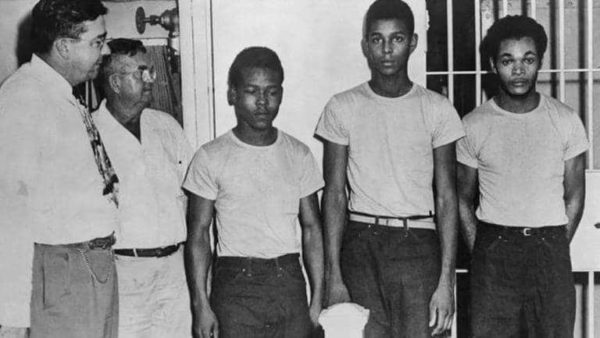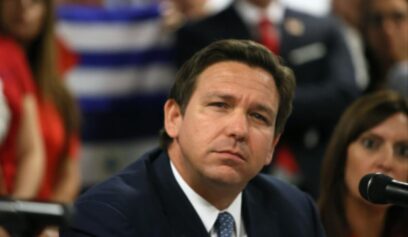Florida’s incoming agriculture chief is working to get a formal pardon for four young Black men who were wrongfully accused of raping a white woman in what’s considered to be one of the grossest miscarriages of justice of the Jim Crow Era.
In a statement Monday, Nikki Fried said she’ll mention the case of the Groveland Four during the first Florida Cabinet meeting next year, forcing a vote she hopes will expedite a review that could lead to a posthumous pardon for the men.

Groveland Four members Walter Irvin, Samuel Shepherd, Charles Greenlee and Ernest Thomas (not pictured) were all either killed, tortured or wrongfully jailed for a crime they didn’t commit. (Photo courtesy of the Florida Memory Project)
“The families have suffered, the Legislature has spoken, and history shows that this was an undeniable injustice — racially motivated and a stain on the history of our state,” Fried said in a statement. “We must look to correct this grave injustice and denounce the abuses of the past.”
“During the collegial discussions, I hope to convince my colleagues that a pardon is the right and just decision,” she added.
As reported by the Miami Herald, the Florida Legislature in 2016 asked Gov. Rick Scott and members of the clemency board to speed up the process to pardon the four men, who were accused of raping a white woman in the central Florida city of Groveland in 1949. The men were then murdered, tortured or falsely imprisoned for a crime they never committed.
Scott and the board members dragged their feet on the matter, however, and the last scheduled clemency hearing before Scott leaves office in January was postponed for the funeral of President George H.W. Bush earlier this month, meaning the pardons would have to wait, the Associated Press reported.
Fried’s action would force a vote to pardon most of the Groveland Four members, two of whom eventually had their convictions overturned by the U.S. Supreme Court. The other two men don’t have convictions on their records to be overturned.
Forcing a vote still won’t guarantee the men’s pardons, however, as clemency board rules require a vote from the governor, as well as two members of the board in order to pardon someone.
Incoming Attorney General Ashley Moody said a pardon for the Groveland Four is going to be “one of the first things I look at when we get to work.” Meanwhile, governor-elect Ron DeSantis hasn’t expressed any interest in pardoning the four men, according to the Miami Herald.
If Fried’s plan works, two of the men, Charles Greenlee and Walter Irvin, would be granted pardons. A third man, Samuel Shepherd, had his conviction and death sentence overturned but was fatally shot by Lake County Sheriff Willis McCall before he could be retried.
Irwin, whose conviction was also vacated, survived the shooting and was convicted for the rape a second time. At the time, McCall claimed the men had run away from him, but the evidence showed Shepherd and McCall were shot while laying down.
Meanwhile, Ernest Thomas was killed by an angry mob before he was even charged with a crime.
In 2017, the Florida legislature issued a “formal and heartfelt apology” to the victims’ families and called on the clemency board to expedite pardons for the men.
Not everyone was pleased with the idea of a posthumous pardon, however. Activist and director Tariq Nasheed slammed Fried’s efforts, writing on Twitter, “Doing these type of symbolic ‘pardons’ for Black people who have been dead for decades is a con-job that the Democrats and Republicans need to stop trying to run on Black voters.”
Florid Rep. Kionne McGhee seemed pleased with the idea and said he believed it’s the right thing to do.
“Justice delayed is Justice denied,” McGhee tweeted. “We must do what’s right since it is settled that these young men were falsely accused and wrongfully convicted and sentenced.”
Though two of the men have already had their conviction’s overturned, attorney Chris Hand, one of Fried’s advisers, noted that state clemency laws allow the board to pardon any conviction, even those that have been vacated.
“At the very least, the Clemency Board should recognize the injustices visited upon Mr. Shepherd … and clear their names,” Hand said.


